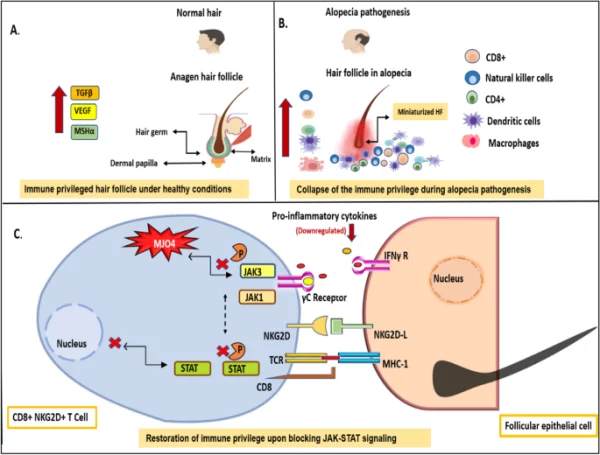Hair loss is a common issue affecting millions of people worldwide. Especially for patients with baldness or hair loss caused by autoimmune diseases, this condition not only makes it difficult to maintain their appearance but also has a profound impact on their mental well-being. However, a recent discovery about enzymes may open up a new approach in treating hair loss, particularly in re-stimulating hair growth, bringing new hope to those seeking more effective solutions.
Recent research by scientists at Harvard University and the U.S. National Institutes of Health (NIH) has shown that Janus kinase (JAK) enzymes could be the key to reactivating “sleeping” hair follicles. According to the researchers, each hair on a person’s head goes through a development cycle, where hair follicles have growth and resting phases. However, in people with baldness, this cycle is interrupted, causing the follicles to shrink and stop producing hair. Despite this, the hair follicles are still alive, just “sleeping” for a long period.

“We found that inhibiting JAK enzymes in resting hair follicles can promote hair regrowth rapidly and strongly.” – Research report from the Harvard University team, published in Journal of Investigative Dermatology (2023).
This discovery opens up the possibility of treating hair loss by using JAK enzyme inhibitors. These drugs are not only effective in treating genetic baldness but could also be applied to other forms of hair loss, including autoimmune-related hair loss such as alopecia areata. Interestingly, some JAK inhibitors have already been approved by the U.S. Food and Drug Administration (FDA) and are currently undergoing clinical trials to treat autoimmune hair loss disorders.
“JAK inhibitors have been shown to awaken resting hair follicles, thus promoting strong hair growth, especially in mouse trials.” – Research from the National Institutes of Health (NIH), published in Journal of Clinical Investigation (2022).
Mouse trials have shown promising results, as these drugs helped hair follicles regenerate and even made the hair grow longer. Additionally, experiments on human hair in culture also showed that the hair grew longer compared to when no drug was used. These results not only promote hair growth in animal trials but also have the potential to provide practical solutions for humans.

JAK inhibitors are not only a breakthrough in treating hair loss but also open up the potential to improve other dermatological conditions. Thanks to their ability to awaken dormant hair follicles, this technology could help restore hair growth while offering hope to those with hard-to-treat hair loss issues. Scientists are currently continuing trials to refine this treatment, aiming to not only treat hair loss but also improve the quality of life for those affected by hair disorders.
These studies and trials are opening up tremendous potential for the field of dermatology and aesthetic treatments. As traditional methods no longer meet the demand, these new discoveries regarding JAK enzymes could provide the optimal solution, bringing a new wave of hair loss treatment. These advances could not only stop hair loss but also help new hair grow back stronger and thicker.


HPX24h > Science > Discovering Enzymes That Stimulate Hair Regrowth: A New Opportunity in Hair Loss Treatment
Top Reads from This Category
Science
Direct Brain-to-Brain Communication via the Internet
Science
Artificial Intelligence Outperforms Humans in Treating Depression
Science
Discover Blood Testing Technology Without a Visit to the Doctor
Science
The Science of Measuring Biological Age: New Discoveries About the Aging Process
Science
The Mystery of the Brain Network that Regulates Human Attention Has Been Unveiled
Science
The First Person to Experience Physical Sensations Through a Prosthetic Hand
Science
A New Era in HIV Prevention: Vaccine Set to Launch
Discover New Topics
Space
18 New Planets: Unlocking the Gateway to Exploring Giant Star Systems
Health
How Losing Just 5% of Your Weight Can Reduce the Risk of Diabetes
Animals
Gibbons Develop Vocal Techniques as Powerful as Humans: New Discoveries About Their Unique Sounds
Healthy Eating
Understanding the Important Role of Carbohydrates in Health
Health
Did You Know? Chronic Stress Can Prevent Your Body from Fully Recovering
Science
Work 3.5 Days a Week and Live to 100: This Could Be Your Future
Science
Cow-Free Milk: The Food Revolution Shaping Our Future
Health
What Is Epigastric Pain and What Causes It
Fitness
What is the Ideal Heart Rate for Running?
Health
5 Essential Things Every Woman Should Know About Menopause
Science
China’s Hypersonic Jumbo Jet Could Cut Beijing to New York Flight Time to Just 2 Hours
Health
What Does a Right-Side Headache Indicate About Your Health?
Health
Exploring How Microplastics Enter the Body and Affect Health